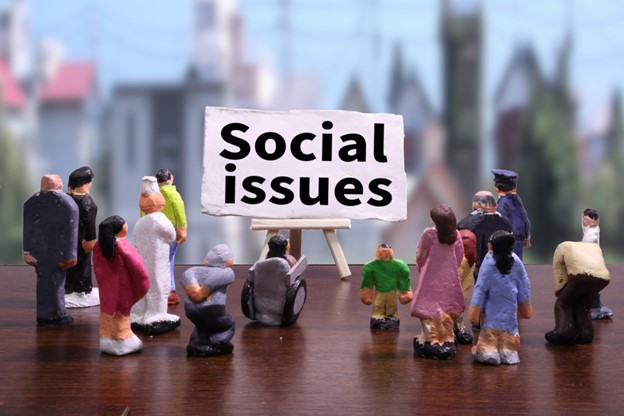Are you interested in getting a job or an internship at a Japanese NGO? While there are a lot of similarities with NGO work in other countries, there are also aspects that are very Japanese. I worked for one year at a human rights NGO in Tokyo and am here to share my experience with you, from how I got the job to what it was like working there.
What is an NGO (and NPO)?

The term “NGO” stands for “nongovernmental organization,” or 非政府組織 (hiseifu soshiki) in Japanese. You should also look for jobs in an “NPO,” which stands for “nonprofit organization,” or most commonly 非営利団体 (hieiri dantai) in Japanese. So what’s the difference? In most cases, not much. Both refer to organizations that are not-for-profit, citizen-led, and work to solve problems for a better society. In Japan, there seems to be a tendency to call organizations that work on issues abroad “NGOs” and organizations that work on domestic issues “NPOs.” In fact, while the former gets more Google hits, the latter seems to be the term more Japanese people are actually familiar with. (For the sake of simplicity, I’m using “NGO” in this article to refer to both.)
There are many types of NGOs that operate in Japan. An NGO can be anything from a village community center or a local animal rescue center to an overseas branch of major INGOs (“international NGOs”) such as Save the Children or Amnesty International. Therefore, while you decide what kind of NGO you’d like to work for, consider the following:
- Do you want to work for a large, medium, or small NGO?
- Do you want to work for an international or domestic/local NGO?
- If you want to work for an INGO, are you looking at the Japan branch of an INGO (with the headquarters abroad), or a Japan-founded INGO (with the headquarters in Japan)?
The type of NGO can make a big difference. For example, I worked in a small, Japan-based human rights INGO. It had a wide scope of activities but few staff members, so the organization relied heavily on interns and volunteers. I had a specific job title in English (which I insisted on), but my Japanese title was usually “staff.” Due to the high turnover rate and uncertain development (dependent on funding, topics, and projects changing), my role ended up differing from what was stated in my contract and changing month to month as the NGO’s needs changed. Therefore, I gained a wide breadth of work experience in many job sectors but wasn’t able to gain as much expertise in any role as I’d hoped. On the other hand, a larger, more bureaucratic NGO in Japan may not take as many volunteers and have a more defined role (and less flexibility in what you can do).
What Is the Reputation of NGOs in Japan?

Another thing to note is that compared to many other high-income countries, the civil society in Japan is relatively weak. That is, there is not much social activism in Japan compared to the US or France, for example. How does this impact NGO work in Japan? There is an (often true) conception of NGO work in the West as “doing good” but being underfunded. Therefore, they tend to have passionate but often overworked and underpaid employees. In Japan, NGO work tends to be even more underfunded and overworked, with even smaller numbers of employees. Anecdotally speaking, some Japanese people I met even had negative conceptions of NGO work, believing it to be just 天下り (amakudari), or, as defined well by The Diplomat, “an institutional practice where senior Japanese bureaucrats are plucked from the civil service and installed in cushy executive positions,” including in the NGO world. Many other Japanese people believe NGO work is just volunteerism or part-time work for “bored housewives.”
Therefore, if you work in the NGO sector in Japan, be prepared for a change in the work environment and benefits–and to explain away some misconceptions. Of course, some are well-paid with fair working conditions and great benefits. However, from my experience working specifically in the human rights sector in Tokyo, if an organization had a good salary, it would often have extremely long working hours (or vice versa). For example, I took my job right after my second year of JET and took about a 30% pay cut, but worked for “only” about 9-10 hours a day (which was considered a higher salary with shorter hours compared to other organizations I met with).
How to Find an NGO Job or Internship in Japan

Given the conditions mentioned above, if possible, I highly recommend you volunteer with an NGO before you commit to paid employment with one. That will give you a sense of what the working environment is like (and if it is a good fit for you) without committing to a contract. Many NGOs are often happy with the extra help.
Another thing to keep in mind during your search is that NGOs in Japan are not usually expecting foreigners to apply. I have only seen a handful of Japanese NGOs specifically target foreigners for jobs and internships. When appropriate, clarify with the organization that they can sponsor your visa, but be prepared to be issued a one-year visa at a time if you have a low (but livable) salary. You may also be required to have a high level of Japanese, and be prepared to do the full application process completely in Japanese. The exceptions to the rule I have met have usually networked with high-up personnel beforehand.
So how do you even find work in a Japanese NGO? If you have a specific organization in mind, go to their website and look for keywords such as 採用情報 (saiyo joho, “hiring information”) or 募集情報 (boshu joho, “recruiting information”). Many NGOs will not advertise on job boards–just through their website or connections. You may also benefit from reaching out to a recruiter.
I recommend the following two job boards as well:
JICA’s partner website for international careers: This job board targets (but is not necessarily exclusive to) alumni of JICA, the Japan International Cooperation Agency (similar to the Peace Corps in the US, or VSO in the UK). You can filter your search for NGOs specifically.
Activo: This is a job board specifically for “NPO” opportunity listings.
Note that both are in Japanese only. They’re great for finding jobs, internships, and volunteering opportunities for “do-good” work.
Good Luck Finding Your Japanese NGO Job!

NGO work is incredibly valuable to society and can be very rewarding. Do some research to determine if it’s the right fit for you and good luck with your search!





One Comment
Charlotte Lewis
November 26, 2023 at 6:55 AMHey, I appreciate your article on NPO work in Japan. I have a different problem though, I have been friends with and have volunteered at an NPO in Japan for many years. I lived in Japan and graduated from a school there with a degree in business level Japanese. I had a student visa before and am now living in my native country of Canada. I’m on disability now though and I’m thinking that I’d like to go back and live and help there as much as I can. Can you get a visa for that? Do you know? I know I can get the 3 month tourist stays but I’m looking for a lot longer.